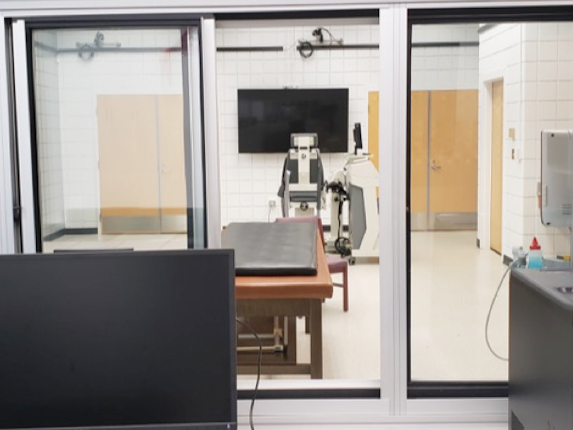Neuromusculoskeletal Health Laboratory
About Us
The primary goal of the Neuromusculoskeletal Health Laboratory is to develop robust indicators of musculoskeletal health and to identify effective treatment strategies that increase physical activity and combat bone and muscle deficits in children with movement disorders.
We have a special interest in cerebral palsy, the most common movement disorder in children. To assess musculoskeletal health we use novel magnetic resonance imaging techniques and dual-energy X-ray absorptiometry.
We are now conducting a randomized controlled trial to assess the effect of a mild vibration treatment on muscle development, physical activity, and balance in children with spastic cerebral palsy.
Join Our Study!
Parent FAQs
What Parents/Caregivers Should Know
Will my child be comfortable? Absolutely! Our goal is to make your child as comfortable as possible while we conduct our studies. We provide snacks, movies, and more to make the experience enjoyable. You are also free to bring in any items of comfort he or she may have at home.
Who will be directly handling my child? Research staff, clinical staff, and research assistants will be administering the tests.
Will I be allowed to be in the testing room? Of course, but there is also an option to sit in an adjoining room that has sliding glass windows to allow you to view the testing.
Grants and Publications
September 2017: Lab director Christopher Modlesky was awarded a $2.9 million grant from the National Institutes of Health to help identify useful treatments to improve the lives and functioning of children with cerebral palsy, the most common developmental disability in children. If a mild vibration treatment is found to increase muscle size and strength and decrease fat infiltration of the muscles while increasing balance and physical activity participation, it would present a viable strategy for reducing chronic disease risk in children with cerebral palsy.
In the News
Lab Equipment and Uses
Magnetic resonance imaging (MRI) allows us to assess the size, architecture, and fatty infiltration of muscle and bone.
Dual-energy X-ray Absorpitometry (DXA): allows us to assess areal bone mineral density, bone mineral content, bone area, bone architecture, bone strength, fat-free soft tissue mass and fat mass.
Ultrasound allows us to assess muscle size, muscle architecture, muscle stiffness, and blood flow.
The Neurocom allows us to assess balance.
Motion capture allows us to assess the kinematics associated with balance, gait, and various motor tasks.
Force plates allow us to assess the kinetics associated with balance, gait, and various motor tasks.
Functional near-infrared spectroscopy (fNIRS) allows us to assess muscle activation during various motor tasks.
Dynamometry allows us to assess muscle strength and spasticity.
Electromyography allows us to assess muscle activity.
Accelerometer-based activity monitors allow us to assess physical activity.
Affiliated Programs
The Neuromusculoskeletal Health Laboratory works closely with the University of Georgia’s Pediatric Exercise and Motor Development Clinic .Info for UGA Students
Undergraduate Students
The Neuromusculoskeletal Health Laboratory offers research experience for students in a variety of majors, such as kinesiology, engineering, biology, computer science, and human development and family science! If you have an interest in working with children or simply gaining experience in a lab environment, the Neuromusculoskeletal Health Lab may be a good fit for you.
Graduate Students
This lab aligns with the program requirements for students pursuing a master’s or doctoral degree in kinesiology with an emphasis in exercise physiology, motor behavior, or biomechanics.
Join Our Team
If you are interested in being a part of the Neuromusculoskeletal Health Lab, please fill out this google form . We are looking for passionate and dedicated undergraduate students to join our team and gain experience in the world of research! We will follow up with you after your form has been reviewed.
If you have any additional inquiries, please email our lab coordinator, Sydni Whitten, at uga.cp.research@gmail.com .
Meet Our Team
Image Gallery
Visit Us

We are located in the academic wing of the Ramsey Student Center.
If you are interested in participating in our study, please email uga.cp.research@gmail.com .
If you are a UGA student interested in joining our team, please fill out this google form .







